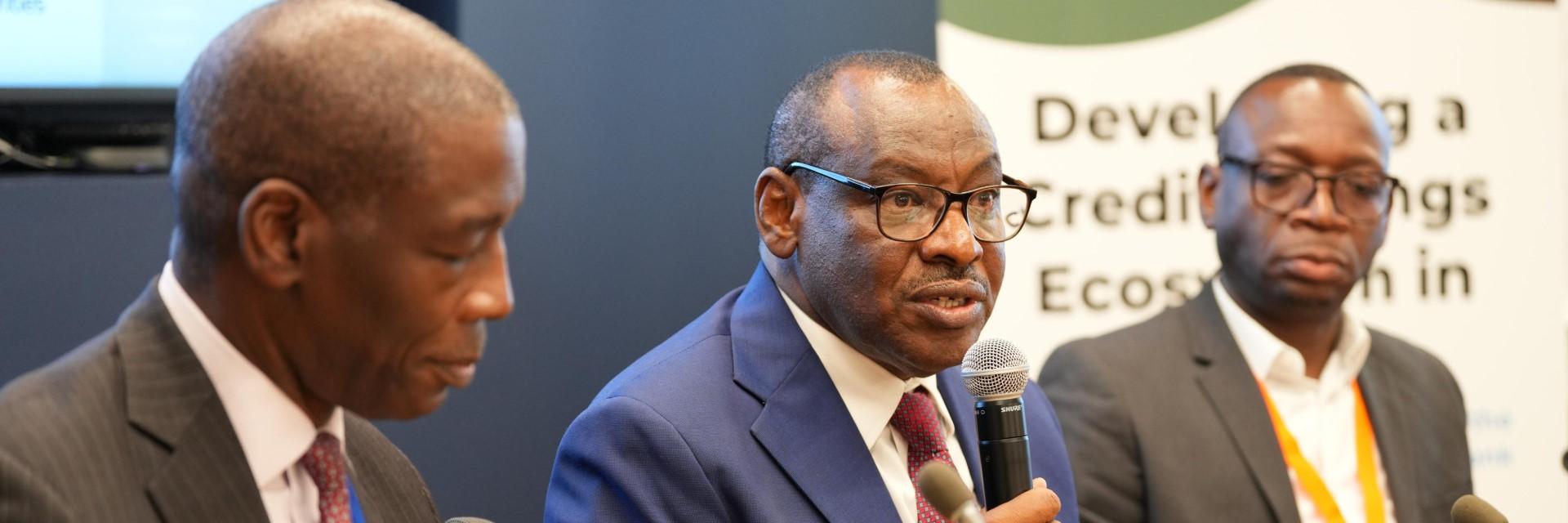2025 SPRING MEETINGS OF THE WORLD BANK AND THE IMF
HIGH-LEVEL EVENT ON DEVELOPING A CREDIT RATING ECOSYSTEM IN AFRICA
Remarks
By
Mr. Claver Gatete
United Nations Under-Secretary-General and
Executive Secretary of ECA
Washington DC, USA
23 April 2025
Esteemed Development Partners and Colleagues,
Distinguished Delegates,
Ladies and Gentlemen:
It is a pleasure joining you today for this timely and important conversation on developing a credit rating ecosystem in Africa.
I thank our co-hosts, the APRM, UNDP, AfriCatalyst, ACET and the Open Society Foundations, for convening this high-level dialogue on the margins of the IMF and World Bank Spring Meetings.
I wish to begin with a question that lies at the heart of our gathering today: Why is it that in a continent of 54 nations, with a combined GDP of US$3 trillion[1] and some of the most dynamic economies in the world, only two countries – Botswana and Mauritius – hold investment-grade credit ratings?
The answer is as frustrating as it is clear: the current global financial system is simply not working for Africa.
Indeed, Africa’s developmental journey has been one of a paradox.
On the one hand, we have immense promises in our dynamic populations, expanding regional markets and increasing innovation across sectors.
On the other hand, many of our countries are grappling with rising debt vulnerabilities, reduced fiscal space and mounting costs of borrowing in international markets.
Yet too often, these ratings have been shaped by limited data, inconsistent criteria and inadequate engagement with African institutions.
And the consequences include higher borrowing costs, constrained access to global capital and fewer resources available for infrastructure, health, education and climate resilience among other sectors.
When we note that African countries have paid on average 12%-14% on Eurobonds interest in the last two years, compared to an average of 3% for the Euro Area or Vietnam, then the need for an African-centered credit rating ecosystem that supports fair, accurate and forward-looking assessments of Africa’s economies cannot be overstated.
This is how we can mobilize affordable, long-term and accessible capital the continent requires for its development agenda, and not the current system that deters foreign direct investment, inflate debt servicing costs and distort perceptions of risk.
To this end, I propose five actionable proposals in our quest to establish a credible credit rating ecosystem for our consideration.
First, we must establish an African credit rating ecosystem that reflects Africa’s regional realities and complements rather than merely mimics global agencies.
This must be an ecosystem that works for Africa, one that is African-led, African-informed and globally credible.
Second, developing a credit rating ecosystem requires that we strengthen data systems.
In this regard, national statistical offices, credit bureaus and regional observatories must be equipped to deliver timely, granular and context-rich data.
Third, we must build a robust regulatory framework, inspired by international best practices such as the European model, where rating actions follow a transparent and predictable calendar.
Fourth, we need cross-sector collaboration such as sovereign issuers, investors, regulators and international partners, all working in harmony.
A well-functioning credit rating system must be greater than the sum of its parts.
Fifth, and most critically, we must build Africa’s domestic capacity.
This means empowering African professionals with the technical expertise and institutions needed to lead credit analysis based on Africa’s own realities.
In this way, African countries will not simply be passive subjects of ratings, but active architects of their own credit narratives.
Distinguished Delegates:
As I conclude, I must reiterate that the ECA is proud to work hand-in-hand with our partners – APRM, UNDP, AfriCatalyst, ACET and the Open Society Foundation – to make this vision a reality.
From technical advisory services to policy research, from supporting debt management offices to facilitating global dialogue, we are committed to ensuring Africa’s voice shapes the financial architecture of tomorrow.
And the timing could not be more strategic.
Given South Africa’s chairmanship of the G20 and the African Union now seated as a permanent member, we have a unique opportunity to push for reforms that reflect the lived experiences of our nations.
Together, we can build a credit rating ecosystem that is truly fit for current purposes and fit for Africa’s future.
Thank you.
[1] Statista data

